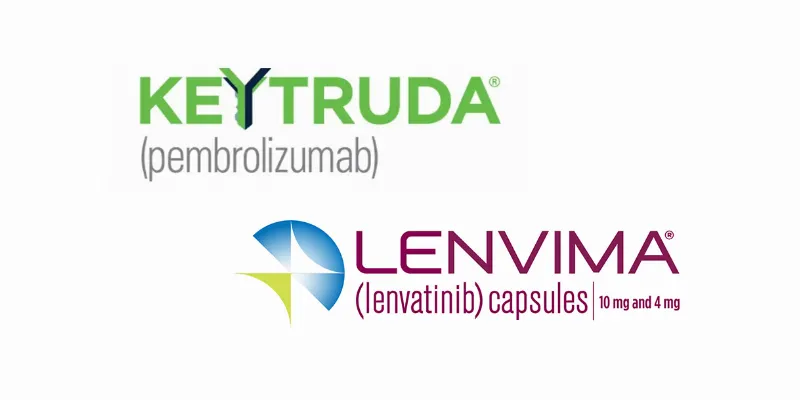Keytruda Plus Lenvima Shows Long Term Survival Benefits for Kidney Cancer

25 October 2023
Merck and Eisai's Phase 3 trial showed that Keytruda Plus Lenvima greatly benefits patients with advanced renal cell carcinoma. The treatment lowered the risk of death by 21% compared to using sunitinib. Additionally, this combination therapy reduced the risk of disease worsening or death by 53%. With fewer side effects, this advancement offers renewed hope for patients and could transform the treatment approach for kidney cancer.
Merck and Eisai, have revealed compelling data from their recent pivotal Phase 3 trial, suggesting a significant survival benefit for patients with advanced renal cell carcinoma (RCC) when treated with a combination of Keytruda Plus Lenvima. The combination therapy, reduced the risk of disease progression or death by 53%, with a median progression-free survival of 23.9 months versus 9.2 months for sunitinib; the objective response rate (ORR) was 71.3% with a complete response (CR) rate of 18.3% for Keytruda Plus Lenvima versus an ORR of 36.7% with a CR rate of 4.8% for sunitinib.
The findings are based on the CLEAR (Study 307)/KEYNOTE-581 trial, which was meticulously designed to investigate the effectiveness of KEYTRUDA (pembrolizumab) Plus LENVIMA (lenvatinib) as a first-line treatment for advanced RCC. After four years of rigorous follow-up, the combined therapy maintained a notable overall survival (OS) benefit. The 24- and 36-month estimated OS rates stood at 80.4% and 66.4% for the combined treatment, compared to 69.6% and 60.2% for sunitinib.
Furthermore, the combination therapy also showed a remarkable reduction of 53% in the risk of disease progression or death. With a median progression-free survival of nearly 24 months, the results were significantly better than the just over 9 months observed with sunitinib alone.
Dr. Thomas Hutson, DO, Pharm.D., FACP, Director of the Urologic Oncology Program, emphasized the importance of this combination therapy,
“KEYTRUDA plus LENVIMA continues to demonstrate durable clinical benefit as a first-line treatment for patients with advanced renal cell carcinoma, as shown by the clinically meaningful improvement in overall survival sustained with four years of follow up. Furthermore, these data also showed clinically meaningful improvements in median PFS and ORR compared to sunitinib. These findings reinforce the important role of KEYTRUDA plus LENVIMA as a first-line standard of care treatment option for patients with advanced renal cell carcinoma.”
However, like all treatments, it's essential to weigh the benefits against potential side effects. Although no new safety concerns emerged, treatment-related adverse events were reported in 74.1% of patients on the combination therapy, compared to 60.3% on sunitinib. Common side effects included diarrhea, hypertension, and fatigue, among others.
It's noteworthy that fewer patients treated with the combination therapy needed subsequent anti-cancer treatments compared to those on sunitinib. This indicates not only the effectiveness of the therapy but also its potential to reduce the burden of further treatments on patients.
Renal cell carcinoma is the most common type of kidney cancer, with an estimated 431,000 new cases and 179,000 deaths globally in 2020. It's a disease that is about twice as common in men, and while most RCC cases are discovered by chance during other abdominal tests, around 30% of patients have metastatic disease at diagnosis. The prognosis for these advanced cases has historically been poor, making the results from the CLEAR/KEYNOTE-581 trial all the more significant.
As the medical community awaits further details, which will be presented at the 2023 ASCO Annual Meeting, this breakthrough offers hope for a disease that has seen limited treatment advancements in recent years. As both Merck and Eisai continue their research, the combination of KEYTRUDA and LENVIMA could potentially change the treatment landscape for patients with advanced renal cell carcinoma.
Dr. Gregory Lubiniecki, the Vice President of Global Clinical Development at Merck Research Laboratories, emphasized their ongoing collaborative efforts with Eisai,
“Long-term follow up data from the CLEAR/KEYNOTE-581 trial show the responses to first-line use of KEYTRUDA plus LENVIMA were durable for many of these patients. Through our joint clinical development program with Eisai, we’re continuing to advance our research evaluating KEYTRUDA plus LENVIMA for other challenging cancers as we strive to help even more patients.”
Study design and additional data from CLEAR/KEYNOTE-581
The CLEAR/KEYNOTE-581 trial is a multicenter, randomized, open-label Phase 3 trial (ClinicalTrials.gov, NCT02811861) evaluating LENVIMA in combination with KEYTRUDA or in combination with everolimus versus sunitinib for the first-line treatment of patients with advanced RCC.
The trial enrolled 1,069 patients who were randomized 1:1:1 to receive KEYTRUDA (200 mg intravenously every three weeks for up to 24 months) plus LENVIMA (20 mg orally once daily), or LENVIMA (18 mg orally once daily) plus everolimus (5 mg orally once daily), or sunitinib (50 mg orally once daily for four weeks on treatment, followed by two weeks off treatment).
KEYTRUDA was administered for up to 35 cycles (approximately two years) or until protocol-specified discontinuation criteria were met. After completing two years of combination therapy, LENVIMA may have been administered as a single agent until protocol-specified discontinuation criteria were met. The median duration of response was 26.7 months (95% CI, 22.8-34.6) for KEYTRUDA plus LENVIMA versus 14.7 months (95% CI, 9.4-18.2) for sunitinib.
About KEYTRUDA (pembrolizumab)
KEYTRUDA is an anti-programmed death receptor-1 (PD-1) therapy that works by increasing the ability of the body’s immune system to help detect and fight tumor cells. KEYTRUDA is a humanized monoclonal antibody that blocks the interaction between PD-1 and its ligands, PD-L1 and PD-L2, thereby activating T lymphocytes which may affect both tumor cells and healthy cells. Merck has the industry’s largest immuno-oncology clinical research program. There are currently more than 1,600 trials studying KEYTRUDA across a wide variety of cancers and treatment settings. The KEYTRUDA clinical program seeks to understand the role of KEYTRUDA across cancers and the factors that may predict a patient's likelihood of benefitting from treatment with KEYTRUDA, including exploring several different biomarkers.











Comments
No Comments Yet!